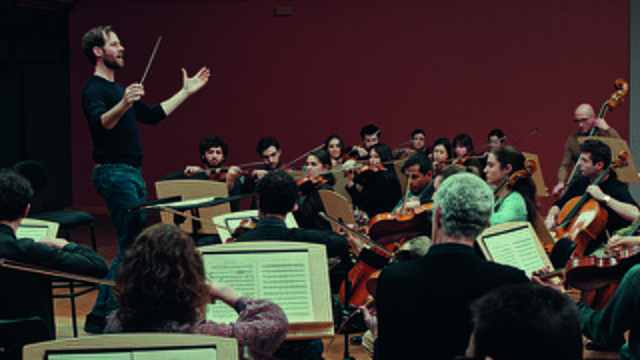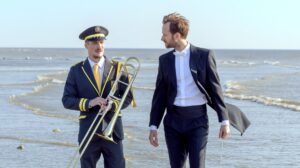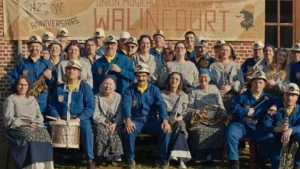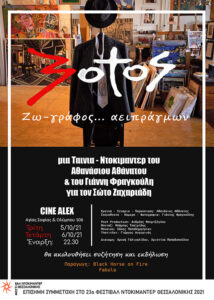EN FANFARE
Απρ 12, 2025 Κινηματογράφος 0

MOVIE REVIEW
THE FILM BY EMMANUEL COURCOL
En fanfare: by Kallitsa Vlachou
Life turned out differently for our heroes, Thibault and Jimmy, the two brothers from France who were unaware of each other’s existence, since they were given to different families for adoption when they were born. Life itself with its own games, those that are not subject to any human law and that cannot be controlled by human intervention, those in which man, when he sees them played out in front of him, discovers with horror his helplessness, realizing his helplessness and experiencing the feeling of what it is like to lose control of things and what you have laboriously built up in your life, to be overtaken, to be pushed aside, as if this life suddenly becomes unknown to you, this life, with its unpredictable games, brings them back together again. When Thibault, looking for a bone marrow donor, is surprised to discover the existence of his brother.
En fanfare: Thibault
Thibault (Benjamin Laverne ), who is an internationally renowned and recognized orchestra conductor, did not arrive in his current position by chance. His fame and recognition is the result of hard and persistent work that required him for 20 years, 15 hours of daily music study. The circumstances of his family life favoured him.
He found himself in an environment where he was given the opportunity to develop and cultivate his talent to the fullest extent. The world he created, a closed world, full of music – difficult music both in its sound and in the technique of its orchestration – kept him away from the daily struggle of making a living, the struggle for survival, the struggle to keep up in a society whose class structure does not allow everyone to claim equal rights.
It does not give everyone the opportunity to cultivate their own talents, to follow their own inclinations, to become the orchestrators of their own lives. In fact, it allows all of the above to its chosen few, those whose livelihood is a given and far outside the issues that concern them. Those who live in another world.
En fanfare: Jimmy
And on the other side, Jimmy (Pierre Lothan). Jimmy, who lives in a northern suburb of France where unemployment is plaguing the region, factories are closing one after another and he, with the threat of unemployment hanging over his head, finds a way out in the factory’s philharmonic orchestra.

A band (that excellent Mark Herman film “The Virtuosi” comes to mind) that the local working class community finds there its refuge, that of unity and collective spirit, at a time when both are being mercilessly shot down by the sweeping tide of profitability and enrichment.
The band for Jimmy is the small community of people where its members, despite the multitude of problems they face, problems that often cause them to distance themselves from each other and momentarily lose their cohesive bonds, nevertheless feel within the microcosm of this society that they are equals.
En fanfare: The music
Their small and insignificant to others band is the society that, in order to prosper, operates completely differently from the outside society. It is the place where it doesn’t leave some members atrophied while allowing others to grow, as is the case in the larger society in which they live.
It is the place where individual problems find their solutions in the collective spirit of individual exposure on the one hand, and recognition on the other, of the impact that this exposure can have on the well-being and common good of all.
Music plays a catalytic role in the meeting of the two brothers. Music that means many different things to each of them. Which can be the field of escape from a stygian reality or the field of inspiration and creation with the sense of completeness that comes from them or which can be the place where the same thoughts, the same anxieties, the same quests of people who have never met and whose lives are a huge distance from each other meet.
En fanfare: The brothers
The two brothers meet in a slow paced encounter at the core of real art. In the transcendence that is achieved through it. Because that’s what art does. It infiltrates people’s lives and begins to remove from them what is useless and meaningless, taking them to another universe where values are meaningful differently and find their proper place.

What a pity that all these conceptualizations take place when life itself, playing its own unpredictable games, mobilizes the mechanisms of alertness and redefinition of the real reason for our existence…
Mahler, Beethoven, Bach, Verdi meet Ravel in the sounds of Bolero, this very special piece of music that begins with a very simple repeated melody that gradually transforms into a musical feast, releasing all the notes that until that moment had not participated.
As if these notes are the lives of people who stand on the margins, invisible, insignificant to many, but who hide within themselves a huge reserve of creativity that explodes when they discover the warmth of solidarity, of understanding, of human communication.
En fanfare: The meaningless
And it is there in this sublime encounter that the artist realizes the futility of individual pleasure and its meaninglessness, when his creation does not give the baton to its recipients to continue his work, each in his own way, from where he left it. For through this continuity comes unity, all become one, and loneliness, the loss of all that we consider most important in our conventional life cease to be traumatic, cease to hurt us, cease to be the center of our existence.
The director of «A triumph», Emmanuel Courcol, once again manages to make us move, laugh, cry at the small big things in our lives and to convey in a very warm and human film that art exists to unite, to liberate and to take us on its sunny paths, where the futility of actions that stems from our egocentric gaze gives way to an acknowledgement of our deep need to join together in a common struggle, the beauty of which lies in the experience of harmonious coexistence.
EN FANFARE
Directed by Emmanuel Courcol
Screenplay by Emmanuel Courcol, Irène Muscari, Oriane Bonduel, Marianne Tomersy, Khaled Amara
Photography by Maxence Lemonnier
Editing: Guerric Catala
Music: Michel Petrossian, Steve Bouyer, Inès Griffart, Pascal Mayer
Sound: Quentin Avrillon, Alphonse Armant, Pierre Picq
Costumes: Laura Vallot
Producers: Marc Bordure, Robert Guédiguian
Cast: Benjamin Lavernhe (Thibault Desormeaux), Pierre Lottin (Jimmy Lecoq), Sarah Suco (Sabrina), Jacques Bonnaffé (Gilbert Vosniak), Clémence Massart-Weit (Claudine), Anne Loiret (Clare), Mathilde Courcol-Rozès (Rose)
Country of production: France
Language: french, english
Year of production: 2024
Genre: comedy, music
Duration: 103΄
For more information on the casting and technical characteristics see here.
Read the film reviews we have published.
Σχετικά άρθρα
-
 RETURN TO HOMELAND
RETURN TO HOMELANDΑπρ 09, 2025 0
-

-
 GIANNIS IN THE CITIES
GIANNIS IN THE CITIESΜαρ 01, 2025 0
-

Στην ίδια κατηγορία
-
 ΤΟ ΚΑΤΑ ΜΑΤΘΑΙΟΝ...
ΤΟ ΚΑΤΑ ΜΑΤΘΑΙΟΝ...Απρ 11, 2025 0
-
 ΓΙΑΝΝΗΣ ΣΠΑΝΟΣ
ΓΙΑΝΝΗΣ ΣΠΑΝΟΣΑπρ 08, 2025 0
-
 Η ΟΡΧΗΣΤΡΑ ΤΟΥ...
Η ΟΡΧΗΣΤΡΑ ΤΟΥ...Απρ 07, 2025 0
-

Αναζήτηση
-
 WONDER WOMAN
WONDER WOMANΙούν 09, 2017 138
-
 ΠΑΙΔΙΚΗ ΣΚΗΝΗ
ΠΑΙΔΙΚΗ ΣΚΗΝΗΟκτ 12, 2014 2
-
 ΚΛΗΡΩΣΗ ΠΡΟΣΚΛΗΣΕΩΝ
ΚΛΗΡΩΣΗ ΠΡΟΣΚΛΗΣΕΩΝΜαρ 22, 2014 2
-
 ΔΥΟ ΜΕΡΕΣ, ΜΙΑ ΝΥΧΤΑ
ΔΥΟ ΜΕΡΕΣ, ΜΙΑ ΝΥΧΤΑΝοέ 13, 2014 2
-
 ΑΧΙΛΛΕΑΣ ΨΑΛΤΟΠΟΥΛΟΣ
ΑΧΙΛΛΕΑΣ ΨΑΛΤΟΠΟΥΛΟΣΝοέ 09, 2014 2
-
 ISTABUL FILM FESTIVAL
ISTABUL FILM FESTIVALΜαρ 08, 2014 2
-
 EN FANFARE
EN FANFAREΑπρ 12, 2025 0
-
 ΤΟ ΚΑΤΑ ΜΑΤΘΑΙΟΝ ΕΥΑΓΓΕΛΙΟ
ΤΟ ΚΑΤΑ ΜΑΤΘΑΙΟΝ ΕΥΑΓΓΕΛΙΟΑπρ 11, 2025 0
-
 RETURN TO HOMELAND
RETURN TO HOMELANDΑπρ 09, 2025 0
-
 ΓΙΑΝΝΗΣ ΣΠΑΝΟΣ
ΓΙΑΝΝΗΣ ΣΠΑΝΟΣΑπρ 08, 2025 0
-
 Η ΟΡΧΗΣΤΡΑ ΤΟΥ ΑΔΕΛΦΟΥ ΜΟΥ
Η ΟΡΧΗΣΤΡΑ ΤΟΥ ΑΔΕΛΦΟΥ ΜΟΥΑπρ 07, 2025 0
-


Δείτε το τρέιλερ της ταινίας μας, που συμμετέχει το Φεστιβάλ Ντοκιμαντέρ Θεσσαλονίκης.
SOTOS, EVERLASTING PAINTER (TRAILER)
Youtube
Επικοινωνήστε
ΓΙΑΝΝΗΣ ΦΡΑΓΚΟΥΛΗΣ
Email: info@filmandtheater.gr
Τηλ: (+30) 6974123481
Διεύθυνση: Ιωαννίνων 2, 56430, Σταυρούπολη Θεσσαλονίκη
![]()

